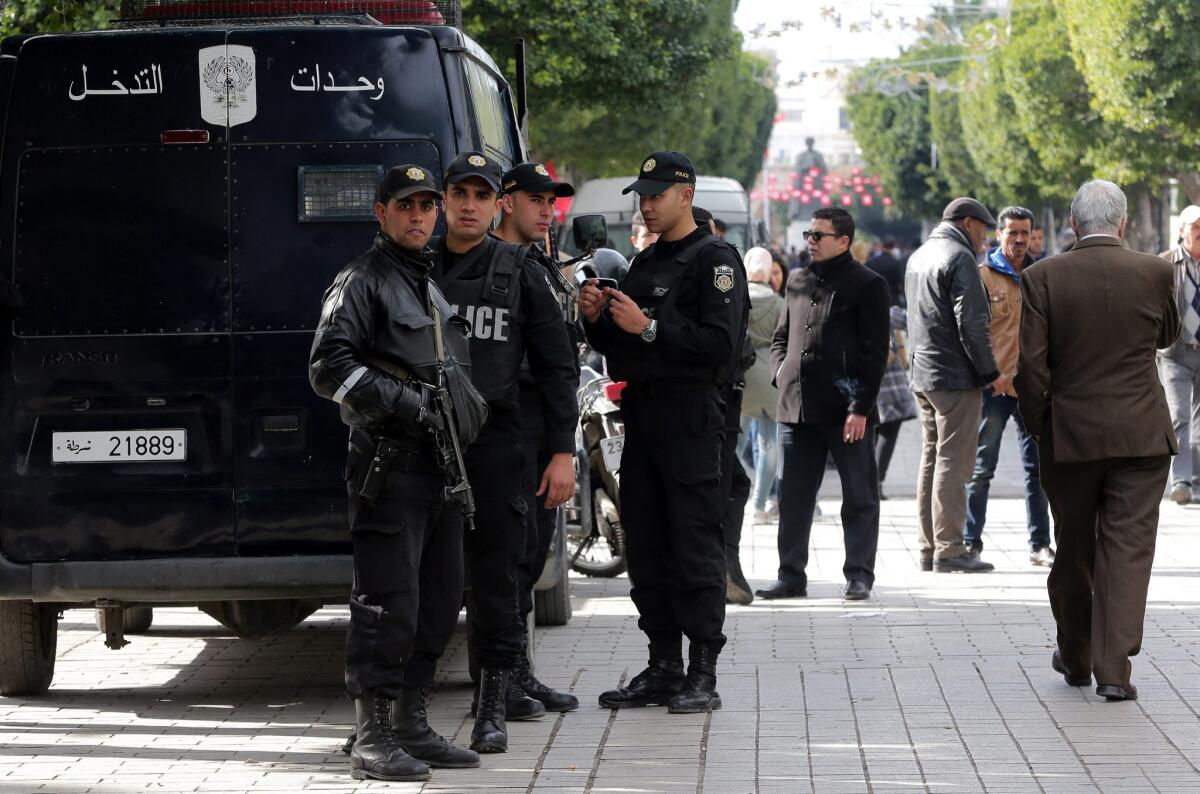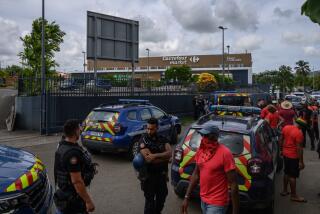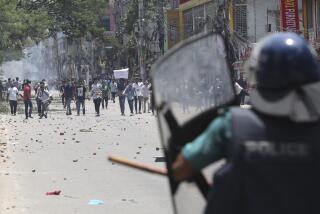Tunisia unrest leads to nationwide curfew

Tunisian security forces stand guard at Bourguiba Avenue, in Tunis, Tunisia, on Friday. Tunisian authorities imposed a night-time curfew across the country following violent protests against unemployment.
- Share via
Reporting from Kasserine, Tunisia — Tunisia imposed a nationwide overnight curfew Friday in response to growing unrest as protests over unemployment across the country descended into violence in some cities.
A curfew from 8 p.m. until 5 a.m. was declared because the attacks on public and private property “represent a danger to the country and its citizens,” the Interior Ministry said.
See more of our top stories on Facebook >>
Overnight into Friday, police stations came under attack and security officers used tear gas to repel protesters armed with stones and Molotov cocktails. In housing projects on the outskirts of the capital, Tunis, roving groups of young people pillaged a bank and looted stores and warehouses.
The previous night, a police officer died after protesters flipped his car, the government said.
The week of increasingly violent demonstrations was triggered Sunday when a young man who lost out on a government job climbed a transmission tower in protest and was electrocuted. The suicide more than five years ago of another unemployed youth set off a popular uprising that overthrew Tunisia’s longtime ruler and eventually gave rise to the “Arab Spring” uprisings across North Africa.
Tunisia built the only democracy to survive that movement, which spawned chaos elsewhere in the region. But the country’s economy is foundering, and about one in three young people remains without work.
“Are we not Tunisians too? It’s been four years I’ve been struggling. We’re not asking for much, but we’re fighting for our youth. We’ve struggled so much for them,” said Leila Omri, the mother of an unemployed graduate in Kasserine.
NEWSLETTER: Get the day’s top headlines from Times Editor Davan Maharaj >>
Tunisia’s prime minister, Habib Essid, cut short a visit to France to deal with the protests. Tunisia’s unemployment rate stands around 15%, but is 30% among young people.
Tunisia has been under a state of emergency since a suicide bombing in November killed 12 members of the presidential guard in the heart of Tunis — an attack that capped an unusually violent year for Tunisia. That bombing, as well as deadly attacks earlier in the year against the Bardo museum in Tunis and the tourist beach town of Sousse, were claimed by the Islamic State group.
In Paris just before leaving for home, Essid said the problem was not with democracy, but with the economy.
“We have a set of policies to try to solve this issue, which is one of this government’s main challenges,” he said after his meeting with the French president. “We don’t have a magic wand. We can’t solve the problem of unemployment in one go.”
France promised aid worth 1 billion euros (about $1.08 billion), much of it dedicated to inland regions far from the relatively glamorous coastal areas that include the resort of Sousse. But tourism, the main driver of Tunisia’s economy, plummeted after last year’s attacks, leaving even the coasts struggling.
“You want a solution? It’s easy: Give the people jobs, instead of pouring millions into Sousse,” said Abid Khadhraoui, another unemployed graduate. “You had five years and nothing happened. All we want are jobs!”
ALSO
Diplomats prep for Syria peace talks scheduled in Geneva next week
Why markets are anxious about Iran’s reentry into the global economy
Israel plan could lead to more Jewish settlements in occupied West Bank
More to Read
Sign up for Essential California
The most important California stories and recommendations in your inbox every morning.
You may occasionally receive promotional content from the Los Angeles Times.










